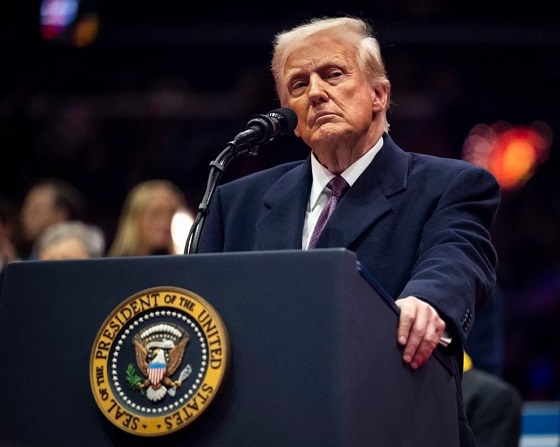From The Center Square
American’s northern neighbor will get the same 25% tariff except with a 10% tariff on Canadian energy resources. That will continue “until Canada cooperates with the U.S. against drug traffickers and on border security,” the statement said.
President Donald Trump on Saturday moved to hold Mexico, Canada and China accountable with tariffs on the nation’s top three trading partners, raising concerns about the potential for higher prices.
“This was done through the International Emergency Economic Powers Act because of the major threat of illegal aliens and deadly drugs killing our Citizens, including fentanyl,” Trump wrote on Truth Social. “We need to protect Americans, and it is my duty as President to ensure the safety of all. I made a promise on my Campaign to stop the flood of illegal aliens and drugs from pouring across our Borders, and Americans overwhelmingly voted in favor of it.”
Trump put in place a 25% tariff “to be paid for by Mexican producers until Mexico cooperates with the U.S. in the fight against drugs,” a White House statement said.
Tariffs are taxes paid by the companies that import goods.
Fentanyl is an opioid blamed for more than 75% of U.S. overdose deaths.
“Mexican cartels are the world’s leading traffickers of fentanyl, meth, and other drugs,” the statement said. “These cartels have an alliance with the government of Mexico and endanger the national security and public health of the United States.”
American’s northern neighbor will get the same 25% tariff except with a 10% tariff on Canadian energy resources. That will continue “until Canada cooperates with the U.S. against drug traffickers and on border security,” the statement said.
Trump’s Canadian tariff is further aimed a stopping illegal border crossings.
“Illegal border crossings from Canada reached historic new highs every year for the last four fiscal years,” the White House said.
For China, the tariff will be an additional 10% until it cooperates with the U.S. on the fight against fentanyl.
“The Chinese Communist Party has subsidized Chinese chemical companies to export fentanyl,” the White House said. “China not only fails to stem the source of illicit drugs but actively helps this business.”
The tariff’s were posted on The White House’s X account Saturday afternoon.
Mexico, Canada and China are the top three U.S. trading partners responsible for about 40% of U.S. imports in 2024. Some economists say the move could push prices higher for U.S. consumers. It could also start a trade war. All three countries have promised to respond in kind.
Trump initially said the tariffs would be put in place on Jan. 20, but didn’t immediately follow through on that. Rather, he waited until Feb. 1.
Trump promised during his inaugural address that tariffs would make America “rich as hell.”
Trump also promised tariffs would help lower the tax burden on Americans.
“Instead of taxing our citizens to enrich other countries, we will tariff and tax foreign countries to enrich our citizens,” the president said.
Trump’s tariffs could generate $450 billion in revenue a year, according to adviser and investor John Paulson. The amount such tariffs would ultimately bring in depends on multiple factors, including how other nations respond to U.S. tariffs. That makes it “highly uncertain,” according to credit-rating agency Moody’s.
Trump previously said he couldn’t guarantee that his tariff plans will not raise prices for U.S. consumers.
Tariffs could raise prices for U.S. consumers and slow economic growth. S&P Global, a credit-rating agency, reported that Trump’s proposed tariffs could boost inflation by 1.8% and lower U.S. economic output by 1%, according to a post-election report.
Canadian Prime Minister Justin Trudeau said Friday Canada was prepared to respond.
“If the president does choose to implement any tariffs against Canada, we’re ready with a response – a purposeful, forceful but reasonable immediate response,” Trudeau said.
“We won’t relent until tariffs are removed,” the prime minister said.
Mexican President Claudia Sheinbaum said Friday that Mexico “will always maintain dialogue with the U.S. and that Mexico has multiple plans for a response.”
The United States-Mexico-Canada Agreement, or USMCA, governs trade between the U.S. and its northern and southern neighbors. It went into force on July 1, 2020, and Trump signed the deal.
U.S. goods and services trade with USMCA totaled an estimated $1.8 trillion in 2022. Exports were $789.7 billion and imports were $974.3 billion. The U.S. goods and services trade deficit with USMCA was $184.6 billion in 2022, according to the Office of the United States Trade Representative.





















